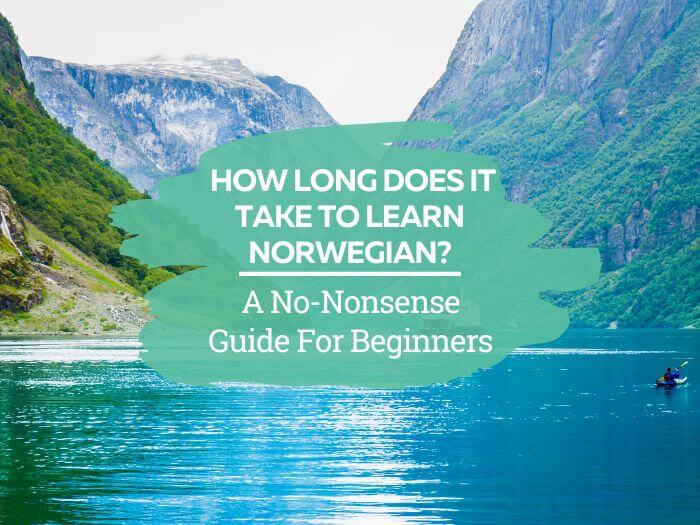How long does it take to learn Norwegian?
Now there’s a question a Norwegian would answer with something like ‘Hvor mange ord er det i en skrivemaskin?’ (How many words can you find in a typewriter? – the expression stems from the pre-computer age).
It means, there is no definite answer to be found written in stone.
Once you have decided to learn a new language, you obviously will want to do so fast. But just how fast can you learn a language like Norwegian?
Keep reading to find out: how long does it take to learn Norwegian?
Pro Tip
By the way, if you want to learn Norwegian fast and have fun, my top recommendation is Norwegian Uncovered which teaches you through StoryLearning®.
With Norwegian Uncovered you’ll use my unique StoryLearning® method to learn Norwegian through story…not rules. It’s as fun as it is effective. If you’re ready to get started, click here for a 7-day FREE trial.
Table of Contents
The Good News About Norwegian

The good news is, once you have decided to learn a new language, Norwegian will be among the best ones to choose if speed is your main concern.
Not only does the vocabulary needed to learn in Norwegian amount to ‘only’ 300,000 words which is far below English's 500,000 words or Portuguese's 850,000 words, but you will also find Norwegian grammar rules easy to adjust to.
Norwegian pronunciation might seem to differ greatly from what you are used to hearing, especially if you are familiar with the sound of romance languages.
However, once you've listened to a few hours of Norwegian stories or binge-watched a couple of Norwegian television series, you'll soon discover that there's a common thread to how certain Norwegian words within a group are pronounced – and you'll adjust to it.
That said, I do strongly believe that the speed and quality of learning a language like Norwegian depends on a variety of factors, and not just one single variable like circumstances, age or talent.
Why Do You Want to Learn Norwegian?

Different people will always have different goals when taking up a new language.
Personal circumstances, professional considerations and your own expectations will play a large role. This also means, that everyone will have a different definition of what it means to ‘know’ a language like Norwegian.
Someone who wants to go on holiday and order from a Norwegian menu or ask a Norwegian for directions will have a completely disparate estimation of ‘speaking a language’ than someone who needs to learn Norwegian to work and live in Norway.
The Common European Framework of Reference for Languages (CEFR) has defined some rules on how to distiguish between various language comprehension levels.
- In Level A, you know the basics. You can introduce yourself, answer questions about your background and perform simple tasks based on slowly spoken instructions.
- Level B takes you to proficiency, where you can keep up a conversation without too much strain on both sides, understand more complex sentences and are able to describe objects and situations.
- Finally in Level C you'll be able to understand (almost) everything in the other language, draw conclusions out of what you hear and while speaking the newly acquired language with ease and without hesitation.
The tourist in Norway will obviously be perfectly happy to reach the first level and consider themselves perfectly able to speak Norwegian.
Someone planning to move to Norway, however, will first be happy when reaching level C – and still might feel that they know the language sufficiently. There will be always more to learn – and to remember.
Reaching level A takes obviously far less time than getting to level C. But who is to judge if you don't already belong to the ‘speaking Norwegian’ category when you manage to understand the directions when asking a Norwegian local for the way?
Geographical And Historical Advantages

Learning a new language should not evolve into a competition on who is doing it better, faster or more comprehensively.
Everybody has their own speed and most will reach the goals they set themselves at the end.
Still, there are a few among English language natives who have the upper hand when it comes to learning Norwegian.
The Scottish
First among those are the Scottish. Vikings aside, Norway and Scotland share a long and often turbulent common history.
The islands of Orkney, Shetland and Faeroe historically had rulers from both countries. And to this day many Norwegians and Scots still meet on fishing boats between their respective borders.
In addition come the oil rigs placed in the North Sea waters between the coastlines of Scotland and Norway, which traditionally employ workers from both nations.
If you ever go out on the weekend in the Norwegian city of Stavanger, you might think you've jumped the channel to Aberdeen – and the other way around – as you will hear an uncommonly large mix of English and Norwegian.
With such close encounters, it's no wonder that the relations have left a mark on both languages. Scots, the traditional Scottish oral language still in use today, shares a huge number of words with Norwegian. Words included are the Scottish words (in bold) for
child – bairn – barn
good – braw – bra
woman – quine – kvinne
church – kirk – kirke
In many circumstances, Norwegians and Scots even share the exact same pronunciation for the words. No wonder then, that the Scottish often learn Norwegian far quicker than the rest of the English-speaking world.
Americans
Also many Americans, especially from the Northern states, have the advantage of a Norwegian heritage, including the language, though some of the expressions used in US Norwegian might sound archaic to the contemporary Norwegian ear.
Nevertheless, Americans with Norwegian heritage will be able to learn the Norwegian language somewhat faster than an average English native speaker.
Yet despite not having the privilege of those very close neighbourly relations to the Norwegians, most English language natives still should be able to learn Norwegian rather fast.
As I mentioned before in the article, Is Norwegian Hard to Learn?, there's much common ground left between the two languages originating in Germanic.
If you come from a different language heritage, for example from one of the Romance, Slavic or even Asiatic and African language groups, despair not.
As you are here right now reading this, there's a large probability that you've learned English in addition to your native language at some point in your life.
And with that achievement, you have acquired a huge advantage when it comes to learning Norwegian – or any other additional language – fast.
The English Déjà-Vu Effect In Norwegian

Research has shown that those who already have acquired one additional language to their native tongue, are more likely to learn further languages faster.
Languages, independent on where in the world they come from, have a tendency to reinforce another.
Once your brain has been wired to the possibility that an object, action, definition etc. can have more than one word to describe it, it will just continue to soak up what other languages have on offer.
In addition comes the worldwide phenomenon of anglicisation, where English words become assimilated into other languages to remain a steady part of it.
Words like “computer”, “stress” or “meeting” are internationally understood – disregarding if the person hearing the word is an English-language speaker, or not.
Norwegian is especially prone to anglicisation where not only single English words have become a regular part of the language, but in many circumstances also entire expressions.
It’s completely normal to say “business as usual”, “worst case scenario” or “work in progress” within a Norwegian sentence and nobody will raise an eyebrow.
With so many English words being part of the language, the process of learning Norwegian will be sped up significantly in comparison to, for example, neighbouring Iceland, where the entire country has made significant efforts to keep English largely out of the vocabulary.
Is There Such A Thing As A Talent For Languages?

Well, the jury is still out on this one. Linguistic researchers have developed a prediction scale called Language-learning Aptitude (LLA) where people supposedly can be tested for their ability to acquire a new language.
While not exactly being controversial, the research on talent in languages is still ongoing, with new insights constantly coming in from not only the field of linguists, but also psychology, neuroscience and medicine.
Judging from my own experience, I’ve never met anyone eager to learn a new language, Norwegian included, but not being able to do so due to lack of talent.
Interest in another culture, the will to communicate and a fierce determination always seem to overcome a supposed ‘lack of talent’ for languages.
However, when in Norway you will usually meet larger groups of especially English language natives from all over the world who even after decades in the country still not have learned Norwegian sufficiently to conduct a basic conversation.
You will quickly find out that this has nothing to do with lack of talent or insufficient language learning aptitude.
The fact is, Norwegians are among the best non-native English language speakers in the world, so many foreigners don't see the need to learn Norwegian.
Age And Language Learning

There is a persistent rumour that children will learn languages much faster than adults.
While this is true to a certain extent, anybody who has a child or teenager in the house also knows, that whatever you say to them will probably already be forgotten within the next 5 minutes.
Languages you might try to teach them will not fare differently. Children and teenagers will retain what is important to them (and not to you), the rest will be ignored or simply slip from their mind.
The exception are bi-lingual households where a second language not only is learned, but also lived and continuously practised.
Adults, however, with their fully developed brains and being in possession of a far wider vocabulary, have the great advantage of picking up a new language and placing the words into relation to their far longer life experience.
The process is called Pragmatic Competence and leads to being able to have deeper conversations that, among others, take the other’s behaviour and mimicry into account.
This leads to a quicker understanding and greater enhancement of vocabulary.
Nobody is ever too old to learn a new language and recent research has shown that speaking another tongue is beneficial for your brain by, among others, postponing dementia and the onset of Alzheimer’s.
Nevertheless, to speed up the process of learning Norwegian, never mind what age you are, you should consider making some additional efforts besides just learning the vocabulary.
Creating A Norwegian Language Habitat To Learn Faster

Let’s face it. You want to learn Norwegian because you want to speak to Norwegians. Some might have ulterior motives, like reading yet untranslated Nordic Noir novels by their favourite Norwegian author.
Yet for most, the epitome of learning a language is to have a conversation with a local. This requires confidence – which usually comes with practice.
If you live already in Norway, good on you. Practice will come easy, and you will already be surrounded by the language you're attempting to learn.
You will hear Norwegian radio in the shops, watch Norwegian television in the evenings and listen in to Norwegian conversations on the streets and on public transport.
This will enable you to reduce the time it takes to learn Norwegian significantly.
If you, however, live anywhere else but Norway, you will have to find other ways to practice. Luckily, Norwegians are not too difficult to come by.
Most towns and cities with a seaport for example will have a Norsk Sjømannskirken, an organisation looking after Norwegians abroad.
The organisation is known for its hospitality, and you can ask to be included in events, such as a Norwegian Christmas celebration, where you can meet Norwegians to practice your language skills.
Universities will also be able to provide you with contacts to Norwegian student organizations where you live while any place with a ski or mountaineering club is bound to have one Norwegian or more among their members.
Other practical ways to create your own Norwegian habitat can be to listen to Norwegian podcasts at home and in the car or watching Norwegian films and television series.
Also reading books to learn Norwegian can give you a greater familiarity with the language and speed up your learning process. Reading stories in Norwegian is at the heart of my StoryLearning method, which gets you fluent through stories, not rules.
FAQs About How Long Does It Take To Learn Norwegian?
How long does it take to learn Norwegian?
Norwegian is one of the fastest languages for native speakers of English to learn.
The US Foreign Service Institute (FSI) has calculated the time it takes to learn a language based on the difficulty level of the vocabulary, grammar and written characters as well as similarity to English.
Norwegian belongs to the first category, which represents the easiest group. According to a list issued by the FSI, it should take around 24 weeks to learn Norwegian to a passable level.
This is obviously depended on your eagerness to learn the language and your willingness to practice Norwegian regularly.
How long does it take to get fluent in Norwegian?
According to the US Foreign Service Institute (FSI) it takes 24 weeks (600 class hours) to reach general professional proficiency in Norwegian.
This means that, after around 6 months, you'll be able to keep up a basic conversation in Norwegian, deal with authorities and go shopping without having to fall back on English.
Of course, the definitive answer to the question – how long does it take to learn Norwegian? – doesn't exist. How long it will take you personally depends on several factors such as your native language, your language learning experience and the time you can dedicate to learning Norwegian.
Is Norwegian an easy language to learn?
Yes, Norwegian is among the easiest languages for native English speakers to learn. Norwegian and English share similar grammar such as a subject-verb-object word order. There's also quite a lot of shared vocabulary. Some aspects of Norwegian, such as verb conjugation, are even easier than in English.
Can I learn Norwegian in 6 months?
Yes, definitely. If you're committed to learning Norwegian, you can get to a conversational level in 6 months. To do this, you'll need to dedicate time to learning Norwegian daily, use a solid method (such as StoryLearning) and practise as much as possible.
Then again, the definitive answer to the question – how long does it take to learn Norwegian? – doesn't exist. It may take you less than 6 months, it may take longer. The duration depends on several factors such as your native language, your language learning experience and the time you can dedicate to learning Norwegian.
So Then, How Long Does It Take To Learn Norwegian?
To wrap up, let's try to answer the question – how long does it take to learn Norwegian? – with some numbers.
The US Foreign Service Institute (FSI) has calculated the time it takes to learn a language based on the difficulty level of the vocabulary, grammar and written characters as well as similarity to English.
Norwegian belongs to the first category, which represents the easiest group. According to a list issued by the FSI, it should take around 24 weeks to learn Norwegian to a passable level.
This is obviously depended on your eagerness to learn the language and your willingness to practice Norwegian regularly.
The time frame suggested by the FSI also corresponds closely to my own experience watching English language natives learning Norwegian.
After around 6 months, most ‘students’ I have met could keep up a basic conversation in Norwegian, deal with authorities and go shopping without having to fall back on English.
To begin with, it doesn't really matter if you don't speak absolutely perfectly in a grammatical sense, as long as you can make yourself understood.
When it comes to practice, you should take a look at my beginner course, Norwegian Uncovered, which teaches you through the power of story.
By learning Norwegian through stories, you will not only speed up your comprehension level, but also have lots of fun while doing so.

Olly Richards
Creator of the StoryLearning® Method
Olly Richards is a renowned polyglot and language learning expert with over 15 years of experience teaching millions through his innovative StoryLearning® method. He is the creator of StoryLearning, one of the world's largest language learning blogs with 500,000+ monthly readers.
Olly has authored 30+ language learning books and courses, including the bestselling "Short Stories" series published by Teach Yourself.
When not developing new teaching methods, Richards practices what he preaches—he speaks 8 languages fluently and continues learning new ones through his own methodology.










































